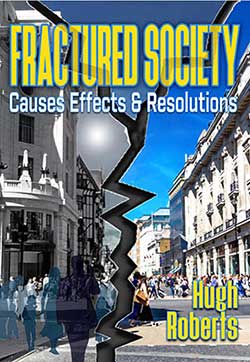Fractured Society Causes, Effects and Resolutions

Scanning across half a century, Fractured Society…Causes Effects and Resolutions looks at how human relations have been coming apart psychologically, summarised by the widespread failure to understand each other. Young people seem more stressed than others, while politics are now more polarised than for a long time past. Wherever you look, at gender relations, the working environment, responses to traumatic events and how people relate to their sense of place – whether positively or negatively - there are profound tensions around how we interact with each other.
But maybe all is not lost! Hugh Roberts examines how every situation can look better in context, applying lessons learned from many years working internationally with different cultures and value systems. He proposes a fresh approach to relationship building, based on empathy and understanding of individual agendas. CV19 has brought communities a renewed sense of collective purpose with digital communication proving vital in sustaining meaningful connections. However the Internet needs to take its rightful place in, rather than take over, the slow re-building of mutual trust.
Fractured Society delivers an upbeat message advocating a better-connected world, encouraging us to adopt a positive empathetic approach to one another, replacing the fear and mistrust of forming new acquaintances.
Chapter Contents
Prologue – Fracture alert – Human relationships fracturing; how they might be mended
Ch. 1 – Youth under Stress – Historical perspective on stress; Decline in relative happiness; The drive to acquire more stuff; Drying up of credit - until recently!; Human connections through a filter; Listen only to the ‘news’ you want to hear!; The dark side of the messaging moon; Unexpectedly better after Coronavirus?
Ch. 2 – Polarised Politics – Style or substance in leadership; Intolerance to disagreement; The comfort of ‘people like us’; Learning Civics; Finding the ends of the political rainbow; Immigrant pontoon, twist or stick; Living with difference; Crusade for transparency.
Ch. 3 – Gender strife – Political correctness rules but I will speak my mind; Feminism and me in the 1970’s; Revolutions are different for everyone; Are men or women ruling the world?; What about sex?; The moderation of VoxPop.
Ch. 4 – Office Worker Isolation – Divisions of Labour; Divisions of Space; The march of digital technology; Failing to toe the line; Open plan in more ways than one; Political Correctness and the Departments of Human Remains; Self Help the only option; Space dynamics; Individualism lives; Mental health the canary in the mine.
Ch. 5 – Homeland loves and hates – Pembrokeshire my county; An Island Love Affair; A child snake charmer; Sense of place through animism; Patriotism games.
Ch. 6 – Coping with Trauma – Experience of war and PTSD; Trauma at the private scale; Traumas at a national scale; The Middle East crucible for suffering; Algeria; Iran; Kuwait; The domestic realm in Middle eastern societies; Fundamentalism to terrorism; Poverty and deprivation; Vietnam; Colombia; Bereavement.
Ch. 7 – Judgement in Context – Never mind the message, who is the messenger!; The loss of spontaneity in conversation; Gaining from a personal crisis in India; Can governments connect with individuals?; Context is everything.
Ch. 8 – Learning from cultural diversity – Over the garden wall – Go West young man, Go West!; Matemanship in Western Australia; Under the last white rulers in Africa; Out of the Anglophone bubble; Algeria 1975 to 1982; Morocco 1977; Bolivia 1978/9; Understanding team dynamics.
Ch. 9 – Meeting people halfway – Travel alone; Sing for your supper; Travel Light; Learn some of the language; Try to be a visitor not a tourist; Avoid more than basic research; Don’t believe everything you hear; Leave prejudices at home; Remain interested as well as interesting!
Ch. 10 – Getting along with nearly everybody – Human talent for adapting; Routes to greater social awareness; Re-shaping of values over time; Body language when speech isn’t enough; Reviewing how places work; Changes in ideology? Not really!; Breaking out of the comfort zone; Love, life and the pursuit of happiness.
Epilogue – How to mend the fractures – Opportunities after pandemic